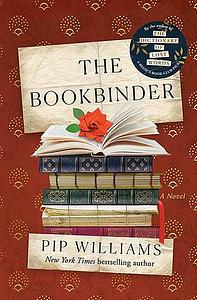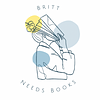Take a photo of a barcode or cover
emotional
hopeful
slow-paced
Plot or Character Driven:
Character
Strong character development:
No
Loveable characters:
Yes
Diverse cast of characters:
No
Flaws of characters a main focus:
Yes
War, war injuries (not graphic), illness, refugee
informative
inspiring
reflective
medium-paced
Plot or Character Driven:
Character
Strong character development:
Yes
Loveable characters:
Yes
Diverse cast of characters:
Yes
Flaws of characters a main focus:
Yes
Very poignant
I enjoyed the characters and and the setting (WWI in Jericho, Oxford, 1914-1920). Peggy and Maude are twins, townies in Jericho working as binders in the print shop. Gwen, Tilda, Rosie, Lott, and Bastian all make the important people in Peggy and Maude's lives. I loved reading about their struggles as the faced war and the Spanish flu. I felt the book was well researched and enjoyed the Author's Note detailing the true events, people, and places she used as inspiration.
Set during WWI this story focuses on a pair of sisters who work as book binders in Oxford. One sister longs to study but the norms for women at universities are very restrictive. The war opens up new opportunities for women to work, even as they seek the vote. A fascinating look at an earlier era and the role that women played.
emotional
hopeful
inspiring
sad
slow-paced
Plot or Character Driven:
Character
Loveable characters:
Yes
emotional
informative
inspiring
slow-paced
Plot or Character Driven:
Character
Strong character development:
Yes
Loveable characters:
Complicated
Diverse cast of characters:
Yes
The Bookbinder of Jericho is a beautifully crafted novel with lyrical prose and a strong feminist theme. Pip Williams vividly captures the struggles of working-class women and the power of books, making it an insightful historical read. However, the slow pace may deter some readers. While the atmospheric details are immersive, the plot unfolds too gradually, making certain sections feel sluggish. The protagonist’s journey is compelling, but the novel sometimes lingers too long on introspection. Despite this, fans of character-driven stories and historical fiction will appreciate its depth and thoughtfulness. A rewarding but patience-testing read.
hopeful
inspiring
reflective
sad
slow-paced
Plot or Character Driven:
Character
Strong character development:
Yes
Loveable characters:
Yes
Diverse cast of characters:
Yes
Flaws of characters a main focus:
Complicated
This didn't absorb me enough to continue, and while it was neat that it overlapped with Esme's book from [b:The Dictionary of Lost Words|49354511|The Dictionary of Lost Words|Pip Williams|https://i.gr-assets.com/images/S/compressed.photo.goodreads.com/books/1576570225l/49354511._SY75_.jpg|74793187], I feel like that kind of diluted it in a way? I was hoping for a fully separate experience, I guess.
Loved the bits about the book publisher/press etc though.
Loved the bits about the book publisher/press etc though.
emotional
sad
medium-paced
Plot or Character Driven:
A mix
Strong character development:
Yes
Loveable characters:
Yes
Diverse cast of characters:
No
Flaws of characters a main focus:
No
A very emotional book. Well written, the story flows and it is hard to put down. It is difficult to accept just how much the lives, work and contributions of women are undocumented in history.
Pip Williams takes readers on a poignant journey through history and the lives of two resilient women in her novel, The Bookbinder. Set against the backdrop of World War I, Williams skillfully explores themes of knowledge, empowerment, and the impact of war on individuals and society.
The story revolves around twin sisters, Peggy and Maude, who work in the bindery at Oxford University press during a time when men are being sent off to war. Peggy, ambitious and intelligent, dreams of a different future where she can expand her horizons beyond the bindery's confines. Meanwhile, Maude finds solace and purpose in the meticulous work of folding pages. Their lives are forever altered when refugees from war-torn Belgium arrive, bringing with them new perspectives and challenges.
Williams' prose is evocative and immersive, effectively transporting readers to early 20th-century Oxford. The historical setting is meticulously researched and vividly portrayed, capturing the atmosphere of the time and the struggles faced by women in their pursuit of education and independence. The author's attention to detail shines through in her descriptions of bookbinding processes, creating a sense of craftsmanship and reverence for the art.
The characters, especially Peggy and Maude, are complex and well-developed, offering contrasting perspectives on the role of women in society. Peggy's desire for knowledge and intellectual growth resonates with readers, highlighting the inequalities and limitations faced by women during that era. Maude, on the other hand, finds fulfillment and contentment within the confines of her work, representing a different path to personal satisfaction. Their relationship as sisters is beautifully depicted, with Peggy's protective nature towards Maude adding emotional depth to the story.
The exploration of the power of knowledge and access to education is a central theme in The Bookbinder. Williams raises thought-provoking questions about who gets to create knowledge and who is privileged enough to access it. Through Peggy's aspirations and encounters with the refugees, the novel delves into the transformative nature of education and its potential to shape lives and challenge societal norms.
The pacing of the novel is steady, allowing the narrative to unfold gradually while maintaining a sense of intrigue. However, there are moments when the plot feels slightly predictable, particularly regarding Peggy's romantic involvement with a Belgian soldier. Nevertheless, the emotional depth and the exploration of broader social issues compensate for any predictability.
In summary, The Bookbinder is a beautifully written historical novel that transports readers to a bygone era. With its compelling characters, meticulous attention to detail, and exploration of important themes, Pip Williams once again demonstrates her ability to shed light on hidden histories through the eyes of strong and resilient women.
The story revolves around twin sisters, Peggy and Maude, who work in the bindery at Oxford University press during a time when men are being sent off to war. Peggy, ambitious and intelligent, dreams of a different future where she can expand her horizons beyond the bindery's confines. Meanwhile, Maude finds solace and purpose in the meticulous work of folding pages. Their lives are forever altered when refugees from war-torn Belgium arrive, bringing with them new perspectives and challenges.
Williams' prose is evocative and immersive, effectively transporting readers to early 20th-century Oxford. The historical setting is meticulously researched and vividly portrayed, capturing the atmosphere of the time and the struggles faced by women in their pursuit of education and independence. The author's attention to detail shines through in her descriptions of bookbinding processes, creating a sense of craftsmanship and reverence for the art.
The characters, especially Peggy and Maude, are complex and well-developed, offering contrasting perspectives on the role of women in society. Peggy's desire for knowledge and intellectual growth resonates with readers, highlighting the inequalities and limitations faced by women during that era. Maude, on the other hand, finds fulfillment and contentment within the confines of her work, representing a different path to personal satisfaction. Their relationship as sisters is beautifully depicted, with Peggy's protective nature towards Maude adding emotional depth to the story.
The exploration of the power of knowledge and access to education is a central theme in The Bookbinder. Williams raises thought-provoking questions about who gets to create knowledge and who is privileged enough to access it. Through Peggy's aspirations and encounters with the refugees, the novel delves into the transformative nature of education and its potential to shape lives and challenge societal norms.
The pacing of the novel is steady, allowing the narrative to unfold gradually while maintaining a sense of intrigue. However, there are moments when the plot feels slightly predictable, particularly regarding Peggy's romantic involvement with a Belgian soldier. Nevertheless, the emotional depth and the exploration of broader social issues compensate for any predictability.
In summary, The Bookbinder is a beautifully written historical novel that transports readers to a bygone era. With its compelling characters, meticulous attention to detail, and exploration of important themes, Pip Williams once again demonstrates her ability to shed light on hidden histories through the eyes of strong and resilient women.




